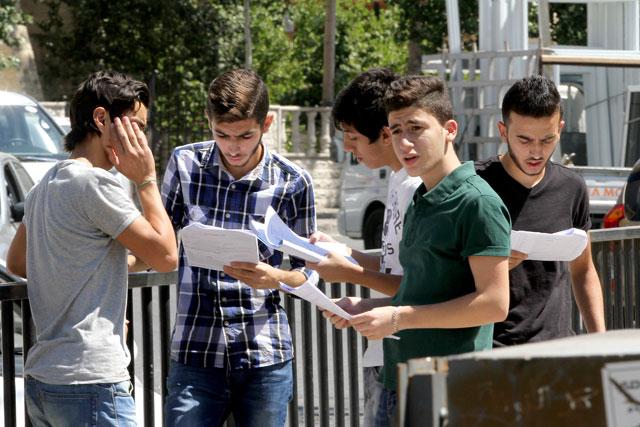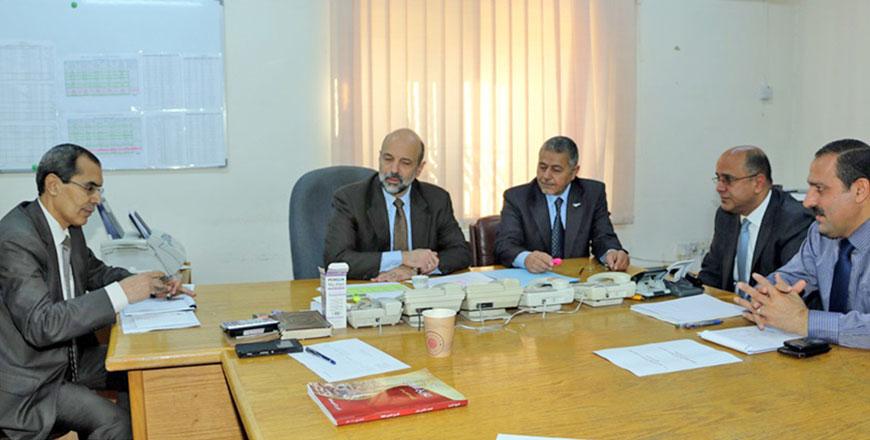You are here
Fasting students face Tawjihi in Ramadan
By Laila Azzeh - Jun 13,2016 - Last updated at Jun 13,2016

General Secondary Education Certificate Examination students will be sitting for exams while fasting this summer session (File photo)
AMMAN — As the General Secondary Education Certificate Examination (Tawjihi) summer session commences, students fear that long hours of fasting will affect their performances.
"I plead to the Education Ministry to consider the long hours of fasting we students have to endure while studying and sitting for the exams," said 18-year-old student Hani Kherfan.
Some 127,874 students are scheduled to sit for the notoriously difficult exams, which coincide this year with Ramadan, when Muslims fast during daylight hours.
The particularly long days of summer will see students fasting for over 16 hours a day.
While Kherfan believes that Muslim students should not "use the exams as an excuse to skip fasting", he urged the ministry to be "lenient when marking the papers".
"Prophet Mohammad and his companions used to fight wars while fasting in Ramadan. Tawjihi students should seize the opportunity of Ramadan to strengthen their will," the student told The Jordan Times on Sunday.
Aya Nouri also believes that students can manage to fast and take the exams, provided that they "plan ahead and eat balanced meals" before and after the fast.
However, for Ola Abul Failat, the "overall environment of Ramadan affects students' concentration and performance".
"The long fasting hours leave you drained and unable to focus. Lack of water and sleep affect our abilities to study properly," she said, adding that the ministry should have rescheduled the exam for after Ramadan.
Parent Ghada Maani also criticised the ministry for its decision to hold the exams during Ramadan, noting that the exam starts at an "unsuitable" time.
"The exam should start early in the morning instead of 11am. This way, students can sleep earlier and finish early before they get tired and dehydrated," she suggested.
According to the Iftaa Department, Tawjihi students should not refrain from fasting because of the exams.
Grand Mufti of Jordan Abdul Karim Khasawneh said that Tawjihi students "should not refrain from fasting unless in cases of extreme fatigue".
The head of Amman’s education department, Ali Momani, said that fasting is "beneficial for mental and physical health".
Doctor Ahmad Miqdadi advises students to drink plenty of water after they break their fast until suhour, the pre-dawn meal to prepare for the daylong fast.
"Students should make sure they are not dehydrated in order for their kidney functions and blood circulation to remain normal," he told The Jordan Times.
As for food intake, the doctor recommends eating vegetables, fish and moderate amounts of poultry and meat, while completely avoiding spicy food and sodas.
"They should also drink herbal teas and fresh juices," said Miqdadi, who warned against smoking cigarettes and shisha to avoid getting chest infections during exams.
Students should also avoid sun exposure, according to the doctor.
Related Articles
AMMAN — The unified Education Ministry exams planned for sixth and ninth graders will not be similar to the General Secondary Certific
AMMAN — This year’s Tawjihi (the General Secondary Certificate Examination) summer session, which started on June 24, has drawn mixed r
AMMAN — Education Minister Omar Razzaz on Monday stressed the ministry’s commitment to improving the quality of education and building on pr















